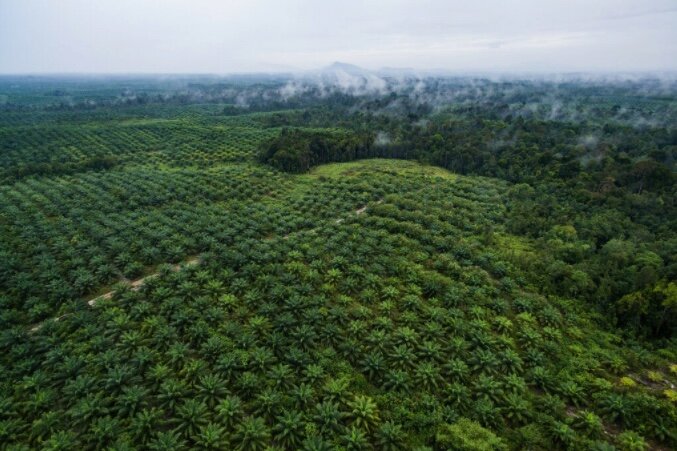Sri Lanka Bans Palm Oil Imports
Aerial view of a palm plantation bordering a forest in West Kalimantan, Indonesia. Flickr
The Sri Lankan government decided to ban the importation of palm oil on April 5. Sri Lanka also began its phased process of uprooting palm plantations in hopes of eliminating the country’s dependence on palm oil, which is an unsustainable commodity. The small island country is a leading producer of coconut oil, and more than one percent of the country’s total area is dedicated to palm plantations alone.
The European Parliament established a new section in the Renewable Energy Directive in early 2018 that banned the use of palm oil biofuels in Europe after 2021. Sri Lanka has followed in the footsteps of countries in the EU, as well as other countries around the world, by banning the importation of palm oil from top producers in order to combat the harmful effects of farming and producing the oil.
Deforestation in particular has become more prevalent than ever. According to the World Wildlife Fund, the degradation of a species’ ecosystem can lead to an increased transfer of zoonotic diseases—or diseases that can spread from animals to humans. This means that the loss of natural habitats may have played a role in the spread of the COVID-19 virus.
While scientists and environmental groups have established that the palm oil industry has caused massive environmental damage, there are still doubts as to whether any alternatives would have a less detrimental impact. The tree used to cultivate palm oil produces significantly more oil per acre than its substitutes. Furthermore, the tree requires fewer fertilizers and pesticides compared to other crops like corn or coconut trees.
The anti-palm oil movement has been opposed by Malaysia and Indonesia, which produce around 85 percent of the world’s supply of palm oil. Critics from the two countries claim that without an efficient and eco-friendly palm oil alternative, the discriminatory ban on palm oil will only impact smallholder palm oil farmers.
Officials believe that Sri Lanka’s ban is not only an effort to eliminate an environmentally harmful product but also a strategic move to eliminate the main competitor of coconut oil. Gnanasekar Thiagarajan, head of trading and hedging strategies at Kaleesuwari Intercontinental, said that “Sri Lanka is a top producer of coconut oil, and palm oil could pose a threat to that sector.”
Sri Lanka imported 160,000 tons of palm oil in 2019, with more than 90 percent of the imports coming from Malaysia. However, the ban will most likely have little to no impact on Malaysia’s palm oil industry, as in 2020 the country exported a staggering 15.4 million tons of palm oil.

